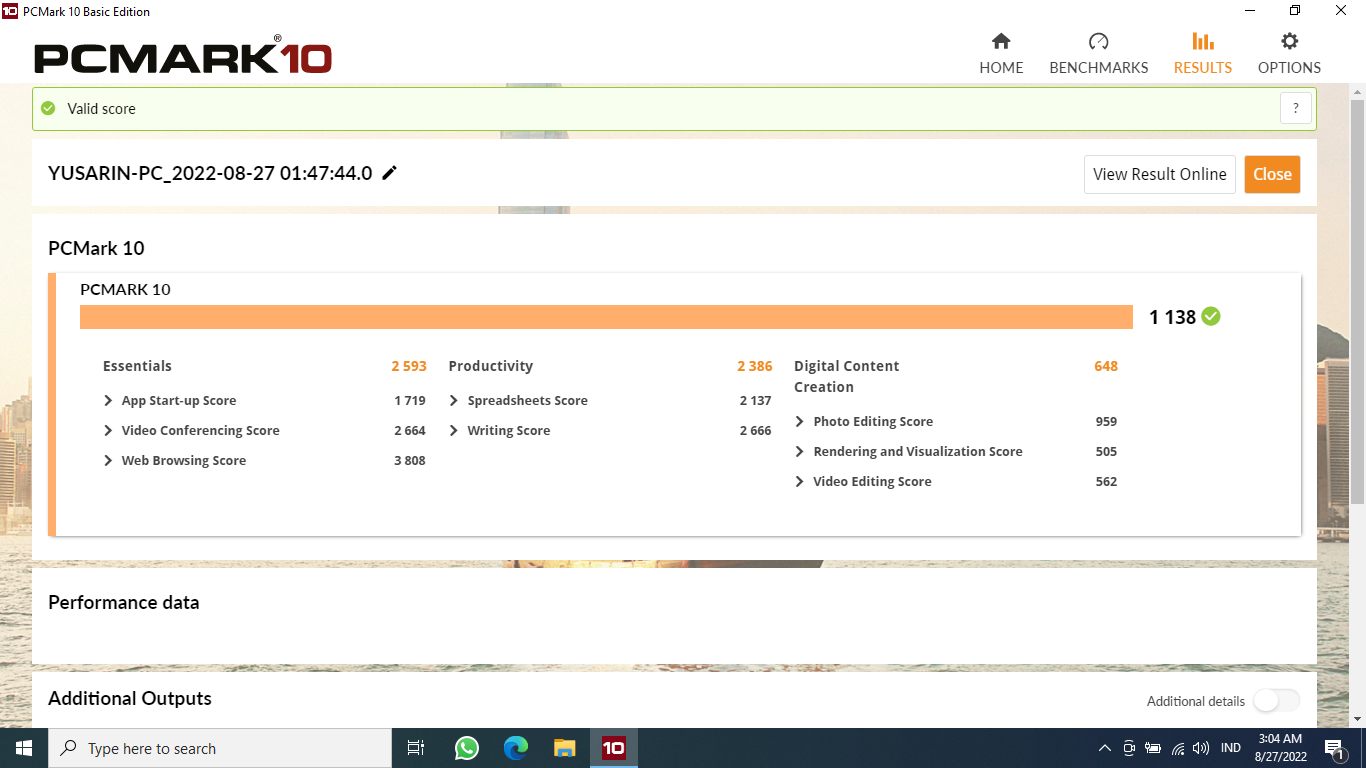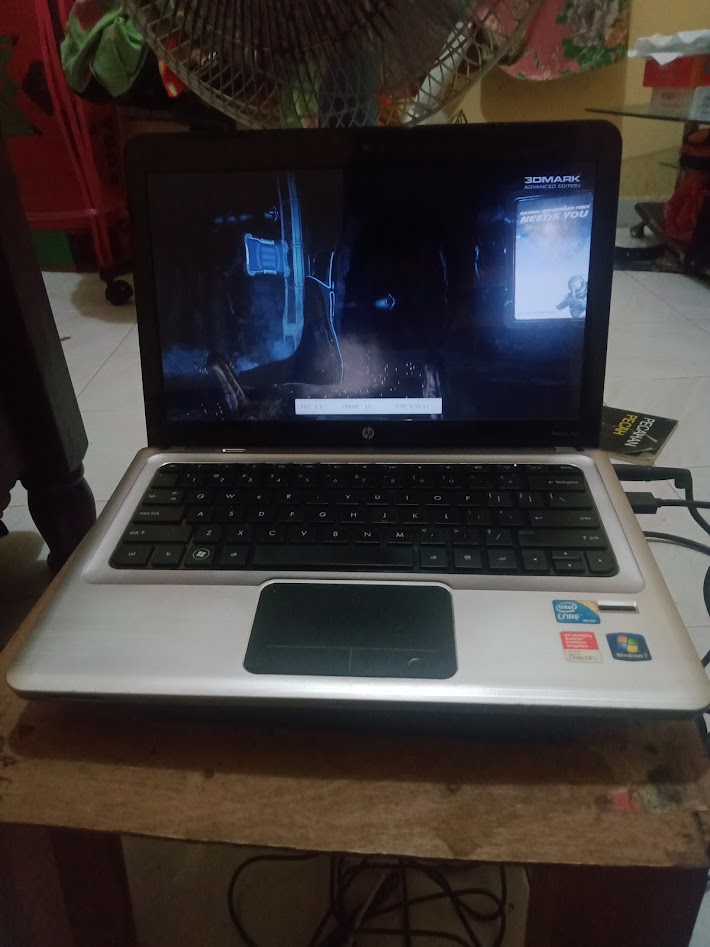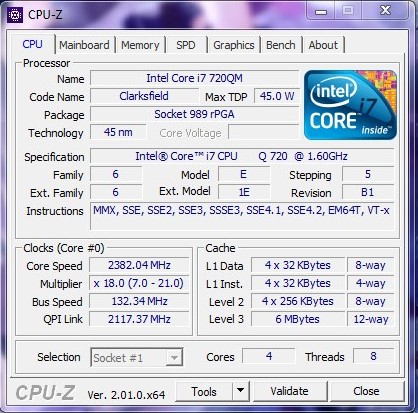PCMark10 score 1138 marks with a i7-720QM
Thursday, 01 January 1970 07:00 | Update at null
Media Gallery
Screenshot

Device, Setup, etc



URL
https://hwbot.org/submission/5068591https://bit.ly/3CUSfp1
Information Detail
Hardware: Intel Core i7 720QM
Specs:CPUID : Intel(R) Core(TM) i7 CPU Q 720 @ 1.60GHz
Architecture : x86
Codename : Clarksfield
L3 Cache : 6MB
Clock : 1.60GHz - 2.80GHz
Core/Thread : 4/8
TDP : 45W
Technology : 45nm
Socket : PGA988
IGPU : -
See more specification...
Software: PCMark10
Score: 1138 marks
About: PCMark10PCMark 10 is a leading benchmark application designed to measure the overall performance of a Windows system based on real-world usage scenarios in the workplace and everyday productivity. Developed by UL Benchmarks, PCMark 10 has become the industry standard for testing PC performance for a wide range of needs, from casual to professional use.
Unlike synthetic benchmarks that only assess CPU or GPU power separately, PCMark 10 takes a real-world activity-based approach. This benchmark runs a series of tests that simulate modern office and productivity activities, such as:
- Document and spreadsheet editing
- Web browsing using various browsers
- Video conferencing and online communication
- Media manipulation such as light image and video editing
- Office-based productivity applications
All tests are conducted using real applications or simulations that closely resemble common applications, ensuring that the resulting scores accurately reflect system performance in real-world scenarios.
PCMark 10 is available in several testing modes, including:
- PCMark 10 Express: Suitable for home users or basic needs.
- PCMark 10 Extended: Adds GPU testing and light gaming performance.
- PCMark 10 Applications: Runs performance tests using genuine Microsoft Office applications (Excel, Word, PowerPoint, and Outlook).
This benchmark is highly useful for businesses, IT professionals, hardware reviewers, and home users who want to objectively and measurably evaluate the performance of Windows laptops or desktops. PCMark 10 is also ideal for comparing performance across devices in terms of efficiency, responsiveness, and multitasking capabilities.
With its modern interface, efficient testing process, and easy-to-understand results, PCMark 10 is an essential tool in the world of system performance testing. This benchmark is continuously updated to keep pace with hardware advancements and the latest software trends, making it relevant for various generations of PCs.
The Intel Core i7-720QM, launched in Q3 2009, was one of the first mobile quad-core processors to feature Intel's Nehalem microarchitecture, specifically the Clarksfield variant. Targeted at high-performance laptops, such as gaming machines and mobile workstations, the i7-720QM brought 4 physical cores and 8 threads to the mobile platform, thanks to Hyper-Threading Technology providing a significant boost in multi-threaded workloads like video editing, 3D rendering, and other professional-grade applications. The processor runs at a base clock speed of 1.6 GHz, but it can dynamically increase up to 2.8 GHz using Intel Turbo Boost, depending on thermal headroom and power availability.
Manufactured using a 45nm process, the i7-720QM has a TDP of 45W, which is quite high by today's mobile CPU standards. This thermal demand necessitated more robust cooling solutions in laptops that featured the chip. Unlike modern CPUs, the i7-720QM does not come with integrated graphics, which means systems based on this processor require a dedicated GPU often from AMD or NVIDIA for graphics processing and display output. As such, it was typically paired with mid-to-high-end discrete graphics cards in its time, making it a solid choice for gaming and multimedia laptops in the late 2000s and early 2010s.
While the Core i7-720QM was a powerhouse during its release, its performance and efficiency are significantly outpaced by modern CPUs built on smaller nodes and with higher IPC (Instructions Per Clock). Nevertheless, legacy laptops using the i7-720QM can still be viable for basic computing tasks like web browsing, document editing, or watching videos especially if paired with an SSD upgrade and increased RAM. Users running Windows 10 on such systems may experience some limitations, but with proper optimization and lightweight software, the CPU can still deliver a usable experience in non-demanding environments.
Hardware Detail:
Device: HP Pavilion dv3-4054TX
RAM: 4GB DDR3 Single Channel
OS: Windows 7, Windows 10
* Not Avaiable
